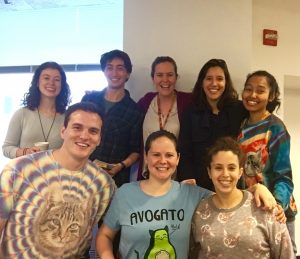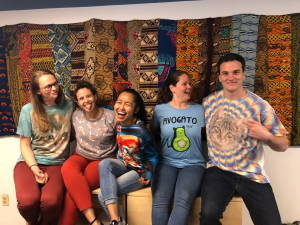Monday, July 23rd, 2018...3:03 pm
DPMI+ Spotlight: Chndy Rogel
 Tell us a little bit about yourself!
Tell us a little bit about yourself!
Hi, I’m Chndy Rogel. I am an international student from the Philippines who moved to California to pursue a Master’s degree in International Policy and Development, with a specialization in Monitoring, Evaluation, and Design. I recently graduated and completed my DPMI+ assignment in Washington, DC as an intern for the Research and Evaluation Department of the Global Education, Employment, and Engagement Unit of FHI 360. While at FHI 360, I programmed mobile data collection tools, conducted data cleaning, and performed qualitative and quantitative analysis for global education projects in West Africa and Central America.
How did you find FHI 360? Why were you interested in working with them?
When I was fresh out of college in the Philippines, I’ve wanted to apply for positions at FHI 360. However, the programs in the Philippines were primarily in health and I do not have any background in health projects. While searching for internships towards the end of my third semester at MIIS, my career advisor reminded me of FHI 360. I went to their careers page and found a research internship with the Research and Evaluation Department of the Global Education, Employment, and Engagement Unit.
I was drawn to working with them because of the variety of sectors they work in and their expertise in monitoring and evaluation. I have limited experience with education projects and I wanted to get exposure to global education through the internship at FHI 360.
What courses at the Middlebury Institute helped prepare you the most for your current position?
The courses that prepared me the most are Introduction to Policy and Data Analysis, Qualitative Data Analysis, Program Evaluation, and DPMI.
What has been an unexpected challenge you have faced while at FHI 360?
My most important takeaway is committing to finishing what I have started. It was a big challenge for me during my final three weeks because most of the tasks that I was anticipating early in my internship came later than expected. I found myself working long hours to finish everything by May 18th. I felt excited that I was trusted with so much work but also found myself getting more exhausted than usual at the end of the day. I realized (and one of my senior colleagues also noted) that it is not sustainable. I almost gave up but realized that I just needed to take more breaks and limit my work hours on weekends. Work-life balance has been a challenge for me and my colleagues have been reminding me about it. The best part about working with the Research and Evaluation Department is having a supportive group of colleagues who are eager to share what they know and would also listen to what you would like to get out of the internship. They also acknowledge the strengths and interests of the members of the team.
I was asked to extend my internship, to which I agreed, but had to take a break for two weeks while I wait for work authorization for my post-completion Optional Practical Training (OPT). International students cannot work after graduation until we have received our one-year OPT. I am continuing my internship until August.
What projects did you work on? How did they relate to your personal mission?
My priority projects are on fidelity of implementation of early grade reading programs in Ghana and Nigeria and on professional learning communities for teachers in Ghana, Nigeria, and Equatorial Guinea. I was also invited to support the work on mapping student disability screening tools for primary school-age children. One of my learning objectives for pursuing an internship at FHI 360 is to learn about their monitoring and evaluation approaches to development projects and the research initiatives they pursue.
My personal mission is to find ways to create equal access to opportunities to improve the quality of life of individuals and to support them in becoming economically active citizens. Improving the education system in developing countries, such as the Philippines, is one way of supporting individuals in reaching their full potential to become productive citizens contributing to the country’s development.
What lessons or skills did you learn “on the job?”
Personally, I have to be better on work-life balance. Even when you enjoy what you are doing, there is a limit to what your brain and body can take. In terms of professional skills, I learned mobile data collection tool programming, which I realized is something that seems to be in demand for the positions that I have been applying for. I also had the chance to observe and participate in the development of an Activity Monitoring, Evaluation, and Learning Plan (AMELP) for USAID during proposal development.
What are your plans now that you have completed your time at FHI 360?
I am currently looking for positions in international development, primarily on research, monitoring, and evaluation. DC is a great place to find headquarters experience on international development. I’m primarily interested in projects on micro, small, and medium enterprise development and livelihoods. The networking skills that I have learned at MIIS have been very useful in reaching out to professionals in this field for career advice and informational interviews.
Thanks, Chndy!
If you would like to know more about DPMI+, please email dpmiplus@middlebury.edu or visit here.




